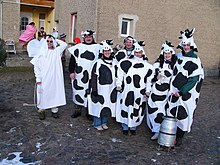Zampern



The Zampern (also called Zemper, Zempern or Heischegang) is an old Sorbian tradition in many villages in the Lausitz . The word comes from the Sorbian "Heischen, Einworth" (camprowanje). The result is today's feast, the year before the carnival time takes place from pre-Christian beliefs, fertility magic , welcome and expulsion spell. Masking and dressing up, making noise and making music as well as beating with life rods ( willow and birch rods) should drive away evil spirits, ghosts and demons.
Camping should also drive away winter and welcome spring. Funny fellows in colorful costumes and sometimes creepy masks roam the villages, rattle and trumpet away the winter, knock on every door and ask the villagers for ingredients for the "Zampernessen", also known locally as "Kreschke", which sometimes takes place on the same day , sometimes takes place the following weekend. This feast (the "squeezing" of bacon, eggs and spirits) takes place partly in the village restaurants, but also with the villagers or in the village smithy.
In the past it was mainly the village youth who roamed the streets, but now adults can also be found within the Zamper societies. The costumes have also changed over time. In the past, old hoods and masks dominated, e.g. B.
- the Pale Rider
- the pea straw bear (an animal mask that embodies spring)
- the "double person", of whom it is said, "the dead carries the living" (a face mask in front and on the back of the head)
- the stork as a symbol of the beginning of spring
- the bear as a symbol of the retreating winter
There are no more limits to the imagination today. Often, even an adjustment to Halloween cannot be completely dismissed.
In the verse "Lausitzer Jahrweiser" it says:
- The year lifts its long beak
- over the carnival village.
- The book of fables is open:
- The pea straw bear, the fur full of winter scab,
- dance in the light
- the dead bears the living
- and doesn't feel any weight yet.
- The takers are also the givers,
- the riddle speaks.
The gifts requested are bacon, onions and eggs, but also wine and liquor. Cash is also welcome. The recipients and their band give a (sometimes rough) serenade on wind instruments, harmonica and boatman's piano , in some places also on a devil's violin . After emptying a glass together with the house owner and a dance with his wife, the company moves on to the next house.
It is also not uncommon to issue passes for pedestrians and drivers at the entrances, which of course have to be paid for. Some of the "highwaymen" wear uniforms from the former GDR People's Police .
